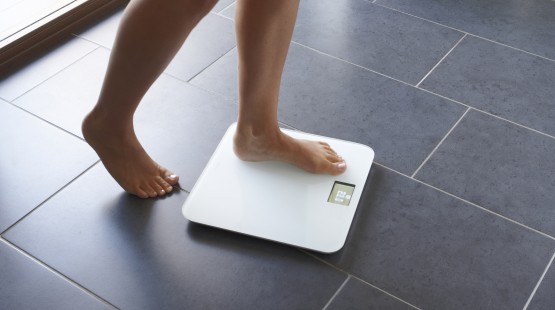What Those Scale-Weight Fluctuations Really Mean
Posted by Michael Vacanti

You wake up and step on the scale.
After emptying the bladder, but before breakfast of course.
THREE POUNDS HEAVIER THAN YESTERDAY?
Is that even possible? They say 3500 calories = one pound of bodyfat, but you didn’t eat 10,000 yesterday. How did you gain 3 pounds?
Short term fluctuations in bodyweight are caused by factors irrelevant to your long term progress.
You are not losing muscle/gaining fat every time the scale swings (like my roommate thinks is happening). Rather, here is what is really going on:
5 Reasons The Scale Moves Like It Does
Bonus: Is Papa John’s Really The Best Pizza of All-Time, and Do I Have A Drinking Problem?
#1: Changes in Glycogen Stores
Glyco-who? No, glycogen.
You see, when we eat carbohydrates, they are stored as glycogen in various places within our body. Those relevant to changes in bodyweight are liver and muscle storage. But, in case you are super curious, we also store some of that tasty CHO in our red and white blood cells, brain and kidneys (in trace amounts).
We are going to skip the boring details and cut to the chase:
How Does This Effect Scale Weight?
Well, we can store somewhere between 50-100g of glycogen in our liver.
Muscle glycogen capacity is a bit trickier. While storage in the liver does not vary too much from person to person, muscle glycogen storage depends on one’s bodyweight, bodyfat %, level of activity and other factors.
Based on all available research, 350-750g is the consensus range for muscle glycogen storage. Although some studies have shown we can store as high as 15g/kg of bodyweight (6.8g per pound) which ends up being more than 750g.
Dude, Scale Weight. Tell me about SCALE-WEIGHT.
Sorry.
Each gram of carb storage causes your body to retain between 2.7 – 4 times that amount in water. The combination of increased carbohydrates and the water bound to each of those causes our bodyweight to increase.
How much?
Well, let’s assume you are dieting. You have been eating fewer carbs than you burn for many days in a row, causing muscle glycogen storage to be very low.
Then you polish off a bunch of carbs because it’s the superbowl, birthday cake, yolo, a planned re-feed day, capt’n crunch, or one of the other 611,424 really good reasons to carb-binge.
https://www.instagram.com/p/toLfgov34f/?utm_medium=copy_link
Your glycogen stores increase by 750g (for simplicity, we will ignore super-compenstation which could actually lead to this number being higher)
750g carbs + (750g*3 water) = 3000g
3000 grams is 6.6 pounds.
In other words, a high-carb day can increase scale weight by 7 pounds.
As an aside, and relevant for beginner weight lifters, your capacity for total muscle glycogen storage increases when you begin strength training. So, if you begin dieting and weight training simultaneously, you may not see scale progress right away.
#2: The Restroom
We can store quite a bit of weight in our large intestines. There isn’t much science needed to back this one up, weigh yourself before and after a good dump. You can experience bodyweight swings of 1-3+ pounds by sitting on the toilet.
#3: Sodium
Let’s say your normal diet is relatively low in sodium. Some meat, lots of veggies and fruits, not too much processed stuff. One night, you crush an entire pizza. Papa John’s, of course. Guess what happens.
Weight is uuuup the next morning. Why? This increased sodium intake caused your body to retain water. Just like eating less sodium than normal will cause bodyweight to decrease.
We’ll keep this brief, but what really matters is variance from your normal sodium intake.
There is a hormone called aldosterone. More aldosterone = more water retention. When you keep sodium low, the body increases production of aldosterone. So, with already high levels of aldosterone coupled with a flood of sodium, the body holds water like crazy.
#4: Boozey-Booze Train
I weighed 185 pounds when I left my apartment last night. After several IPAs, too many tequila shots and some mild Saturday night debauchery, I passed out in my jeans. When I woke up, my breath tasted like a dead person, and the bathroom scale shamed my recent bulking attempt:
176 pounds.

Drinking beer from weird goblets
While it is possible to incorporate booze in a healthy regimen, there may be short term swings in bodyweight.
How dehydrated do you get, exactly?
For every 200 milliliters of beer consumed, the average person releases 320 milliliters of urine.
Now, you can drink lots of water, but for reasons beyond the scope of this article, only about 1/3 of the water consumed will be retained to help with rehydration.
In short, go ahead and drink if you’d like, but be cognizant of the relationship between scale weight and that tasty poison.
#5: Everything Else
Illness, an exhausting workout, certain supplements such as creatine, your menstrual cycle, or God throwing you a curveball because this dieting crap isn’t tough enough already — the scale moves. Sometimes, a lot.
So, What Should I Do?
The scale is an excellent measure of progress in the long term but cruel, heartless and nonsensical in the daily grind.
Like I tell my coaching clients, focus on the things you CAN control: the food you eat, hours you sleep, intensity of training and macronutrients consumed.
If you are the type of person to obsess a bit, weigh yourself less frequently (once every 1-2 weeks). If you can weigh yourself more often without changing your behavior or messing with your head, daily weigh-ins are fine (same time every day).
Lastly, know that these short term fluctuations have absolutely nothing to do with your long term progress.
Frank
Very nicely written! Stuff like this is a big help and a joy to read. I'm confused about one thing - does water retention, as described here, hinder fat loss at all? Or does it just confuse the scales?February 11, 2014 at 12:21 pm |